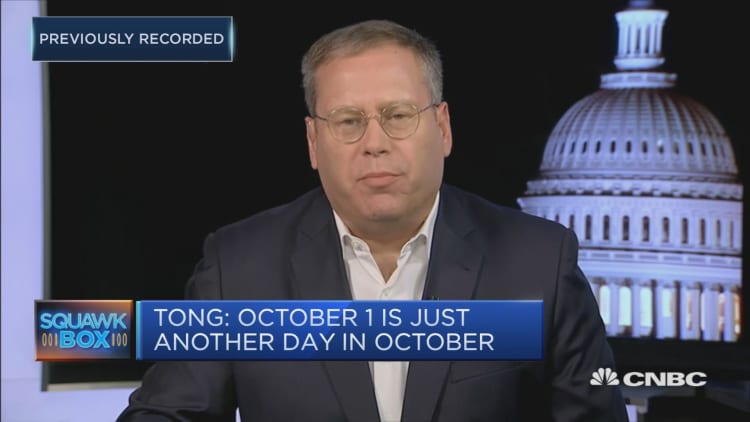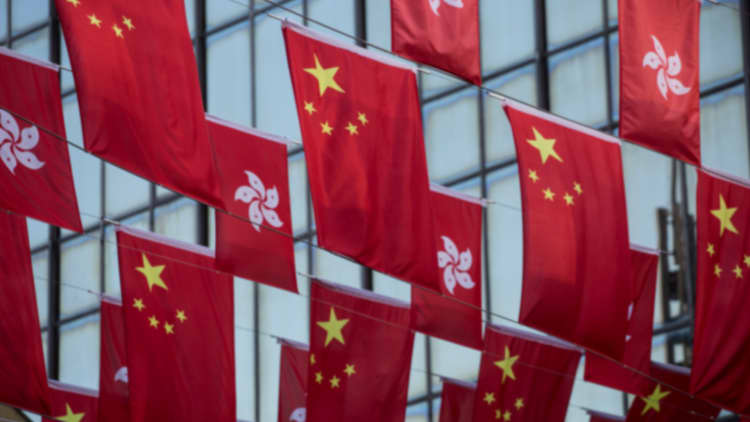Hong Kong braces for another weekend of mass protests.
Ahead of China's National Day, protesters are expected to march the streets on Sept. 28 to commemorate the 5th anniversary of the Umbrella Movement. The organizers posted online, that on Oct. 1 there will be "No National Day. But National Calamity March."
Some have voiced concern that Beijing may deploy military troops to intervene in the city, but Kurt Tong, former U.S. consul general to Hong Kong, told CNBC, "I don't think Oct. 1 is going to be some magic day."
"Beijing will continue to see Hong Kong as a problem but have it fundamentally addressed by the Hong Kong government and the Hong Kong people. Because that is the fundamental aspect of the 'one country, two systems' framework and Beijing stepping in more could make the situation even more difficult," Tong, now partner at The Asia Group, said on "Squawk Box."

In the last four months, protests have become increasingly violent. The city's underground rail system, the MTR, has been repeatedly disrupted. Protesters were seen throwing molotov cocktails at local police stations. The police have often deployed several tear gas on the demonstrators. Clashes between protesters and the police have resulted in injuries on both sides. The turmoil was sparked by a now withdrawn bill that would have enabled extraditions to mainland China from Hong Kong.
Joshua Wong, the secretary general of pro-democracy advocacy organization, Demosisto, told CNBC on Friday that "vandalism or force has been used by protester...is targeted the communist regime."
"We are just demanding the fundamental rights that Beijing promised in the Sino-British declaration, which means free election."
But Tong, a former U.S diplomat, said the ongoing protests have affected businesses and people's attitude toward the normally perceived safe city.
Hong Kong — a former British colony, has cancelled celebratory events for China's 70th anniversary as protests continue. The city, under China's rule, operates under the "one country, two systems" principle that gives its citizens some legal and economic freedoms not given in mainland China.

Tong called that system a "difficult construct," explaining that "it creates anxiety on both the Beijing side as well as the Hong Kong side."
Still, he said, "It's a good idea. It's a feasible idea ... I think it could function on many years to come."
Hong Kong's international position
Although the city's leader, Carrie Lam formally retracted the contentious bill earlier this month, the public clamor has not relented.
Wong, the leader of the Umbrella Movement in 2014, recently met with U.S. lawmakers in an effort to push Congress to pass the Hong Kong Human Rights and Democracy Act.
The bill would make Hong Kong's special privileges, including those related to trade and business, subject to annual review in Washington. It would also put authority figures tied to the crackdown on public dissent at risk of sanctions. Other proposed measures seek to bar exports of crowd-control items to Hong Kong's police force.
Beijing on Wednesday accused the U.S. of "justifying its interference in other countries' internal affairs with its domestic law" by considering such legislation, according to a transcript given to the press. Song Ru'an, deputy commissioner of the Chinese Ministry of Foreign Affairs in Hong Kong, called the proposal "the epitome of hegemony.
But Wong defended the pending U.S. legislation, saying when "one country, two systems eroded ... is the time for international committee monitor the implementation of the joint declaration."
The Asia Group's Tong said, however, "frankly speaking, Hong Kong is not for the United States to liberate. It is part of China — but it's a special part of China."
He explained that even if the U.S. Congress were to pass the contentious bill, it would merely be a "symbolic message" and "an expression of concern from the U.S. about the situation in Hong Kong and it probably won't have that much practical impact."


